What causes high inflation? An overheating economy. But what's the best sign of an overheating economy? Rising inflation.
This doesn't get us anywhere. It will eventually tell us the story, but too late to do any good. So how about if we look at other signs of a possibly overheating economy?
First up is asset inflation. Both home prices and stock prices have been rising above historical trend levels since the middle of last year:
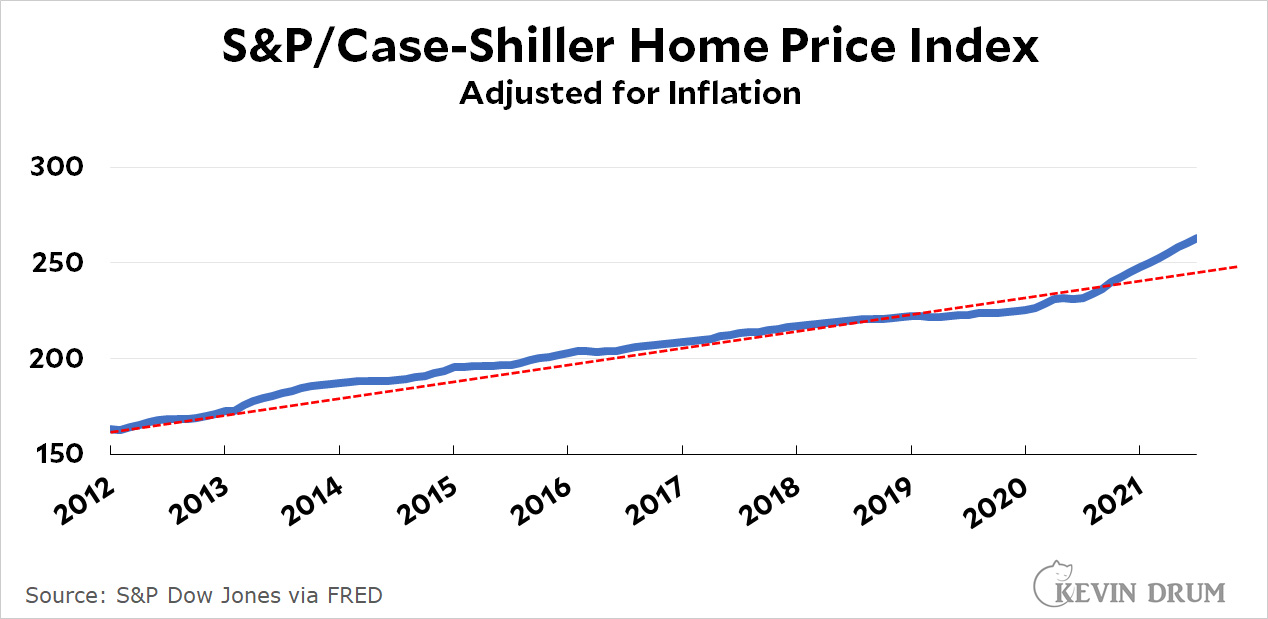
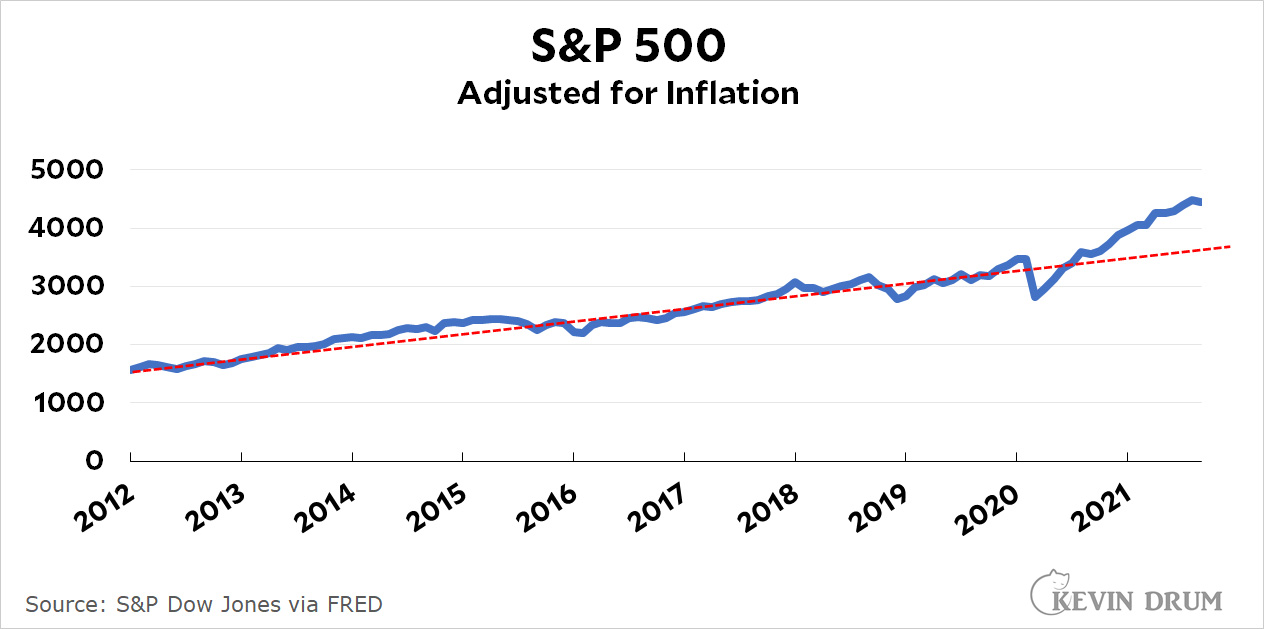
Another sign is household credit. If banks are loaning out a lot of money, that's usually a sign of an economy getting out of control. But that's not happening. Household credit hasn't grown since the start of the pandemic:
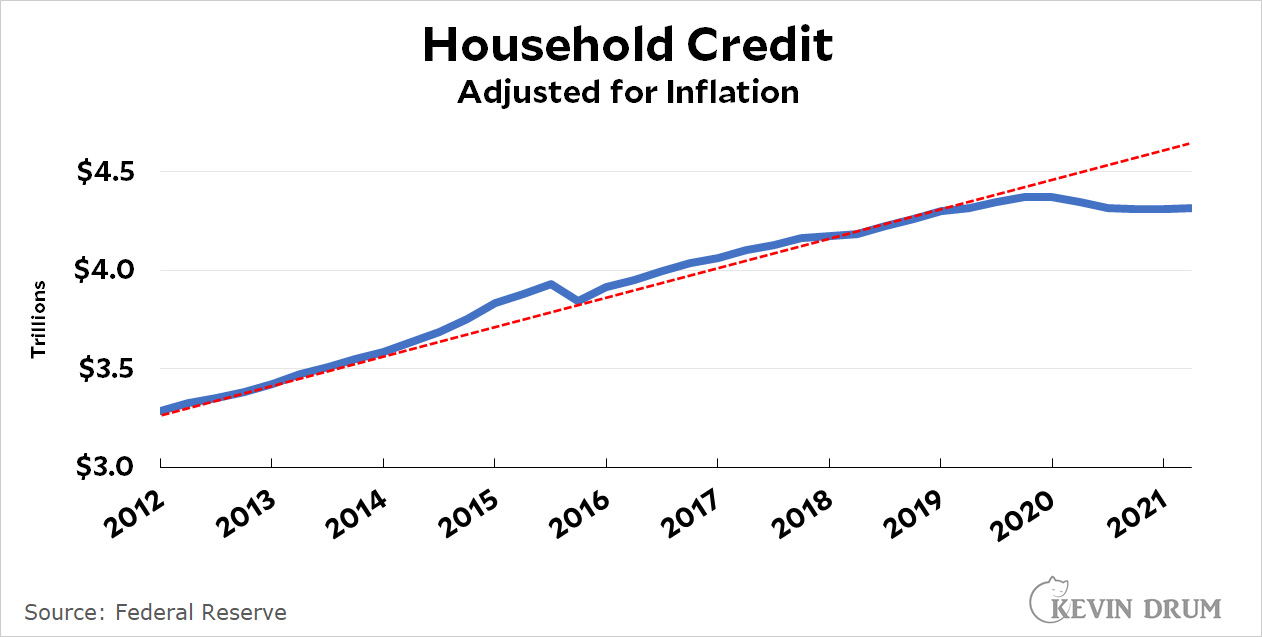
How about personal savings? If people have a lot savings to draw on, that could produce artificially high growth. But the spike in personal savings due to federal assistance programs has nearly played itself out. The overhang in savings is almost gone:
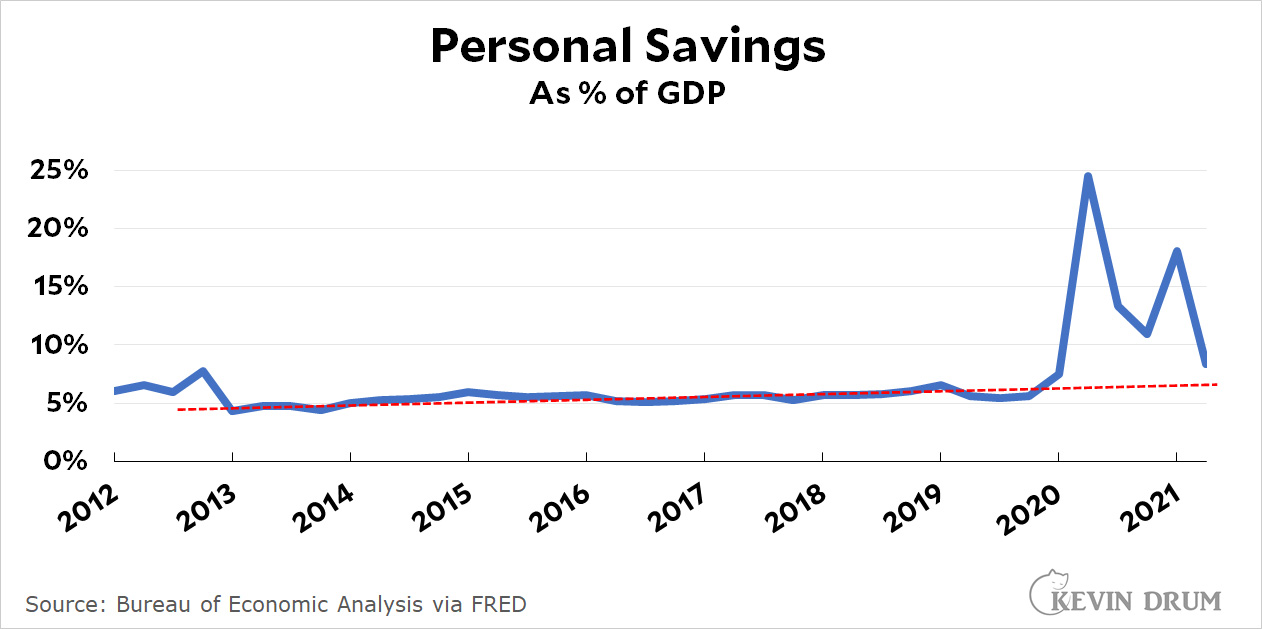
As a result, consumer spending isn't spiking, as it might in an overheated economy. It's right on its old trendline:
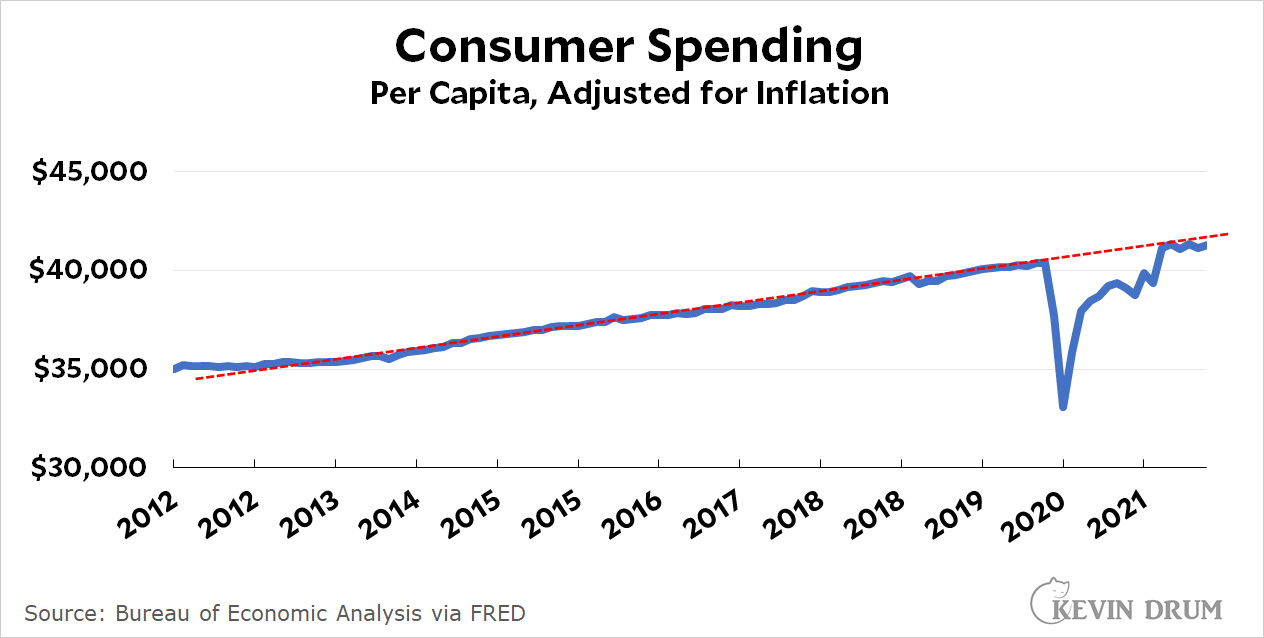
A traditional sign of an overheating economy is a spike in wage growth. But wages have come down from their pandemic high and are nearly down to their pre-pandemic trend:
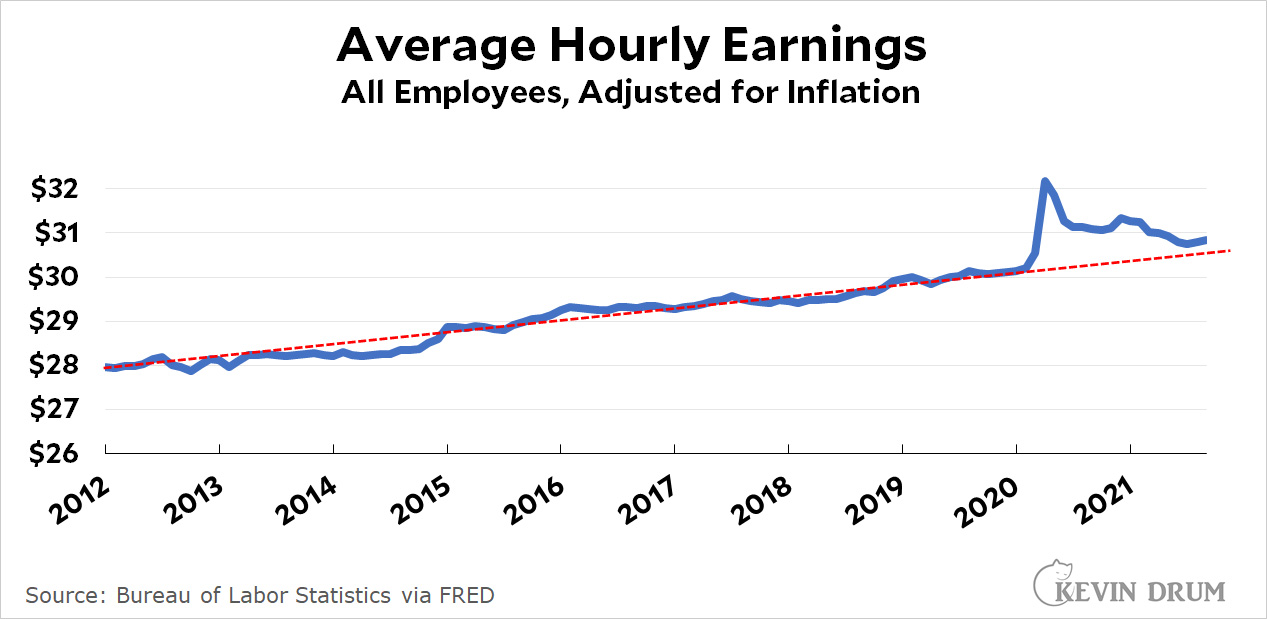
When the economy is strong, people are more confident about their ability to find a new job, so quits go up. Over the past couple of months quits have been high, but at this point they're still only slightly above trend:
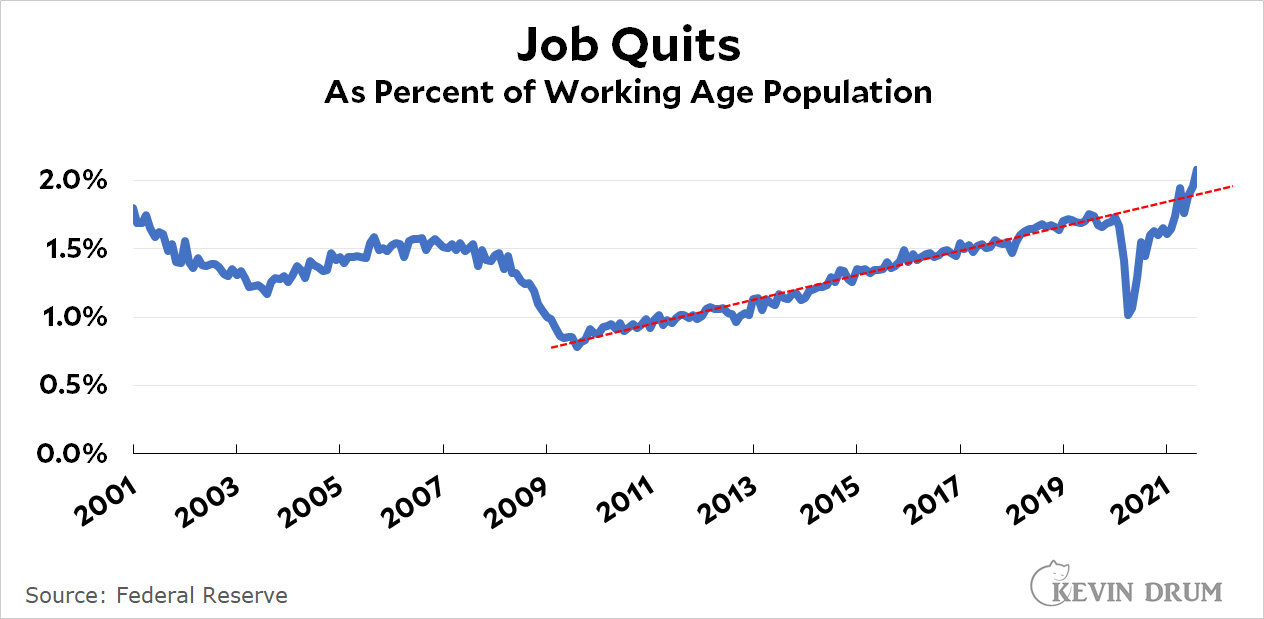
Finally, there's how close GDP is to potential GDP, a measure of the maximum sustainable output of the economy. Potential GDP is an estimate, and a sometimes controversial one, but it remains a useful measure. Currently, the economy is still below its potential, but at its current rate of growth it might reach it fairly soon:
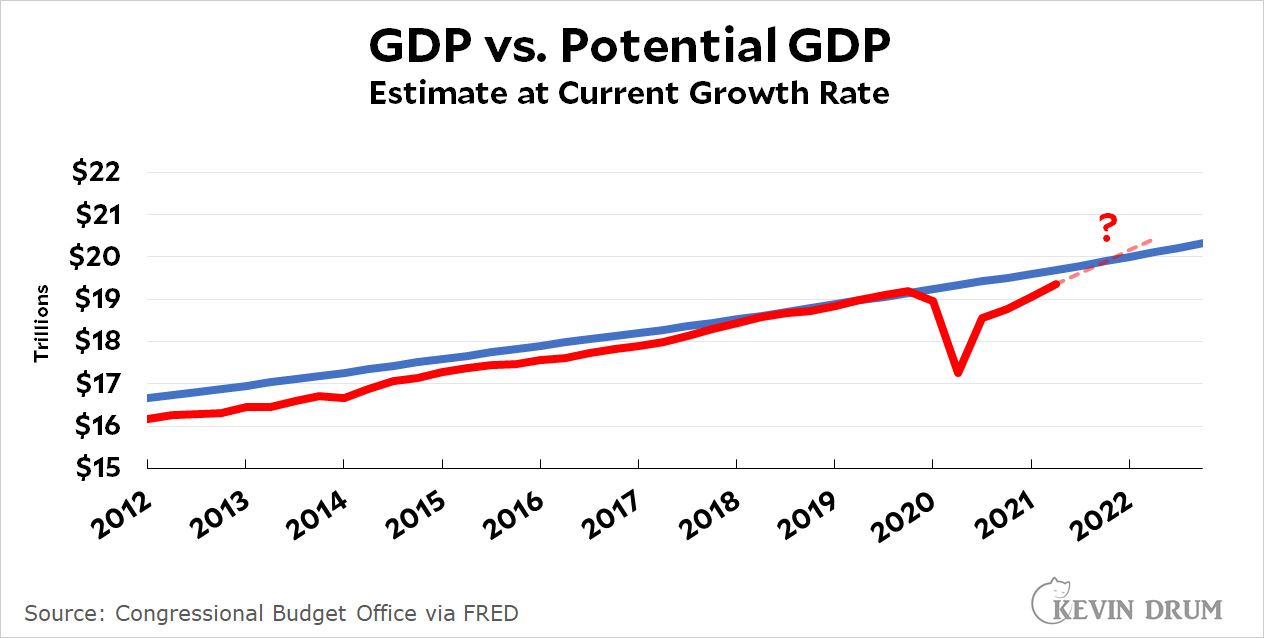
Put all this together and we have one sign of an overheating economy (asset inflation) and half a dozen that show an economy that's fairly normal at the moment. This doesn't prove anything, but combined with the fact that inflationary expectations are well anchored at 1-year, 5-year, and 10-year terms, it does suggest that, at least for now, the economy is strong but not on the verge of roaring out of control.

So we won. Life is good enough. Why are democrats so disappointed? If the working class is doing ok and they also prefer to vote for Republicans then what’s the big deal?
https://theliberalpatriot.substack.com/p/its-time-for-climate-pragmatism
Why do democrats insist on trying to help people who either don’t want or don’t need help? I’m a professional guy with the skills and abilities to compete in this system. Why should I go out of my way to help these working class folks when they aren’t interested?
We won the war. We should stop worrying about it.
Oops. Wrong link. Though that’s interesting too.
Working class woes for democrats. Let them be republicans if they want to.
https://theliberalpatriot.substack.com/p/the-power-of-the-working-class-vote
Can we all agree that this is the trump Nazi theme song?
https://youtu.be/s3SZ5sIMY6o
Christmas tree prices are spiking--expect to hear a lot more about inflation!!!
obviously the first step toward canceling christmas altogether
Not enough truck drivers to get them to market - supply chain
Not enough Christmas trees - due to climate change
Not enough Christmas trees - lack of immigrant labor to harvest them
Not enough Christmas tees? Lack of believe in God by Americans
Not enough Christmas trees - they were stolen.
America - land of excuses
Christmas trees are mold factories - allergic to mold so $$$$ saved.
Annie-
They certainly are.
No, an overheated economy is not what has usually caused inflation. The main thing in rich countries has been wars or the aftermath thereof. What caused the inflation spikes of 1975 and 1980 was oil price. Real wages by any measure of inflation actually fell during those times, and the spikes did not end until oil price stopped rising. There is no real sign now of wages causing inflation as yet - if workers have lots of money to spend it is the remnants of the stimulus payments - there are still many millions missing from the workforce. The entire discussion of inflation by economists, let alone pundits and bloggers, takes place in a world of fantasy.
Why are quits on an increasing trend since 2009?
rhetorical?
The trend seems to follow economic growth. After the crash, people we afraid to quit. After Obama stabilized the economy and it started growing. unemployment fell and people felt more free to quit thinking they'd be able to find a job. Trump coasted on Obama's work--until Covid hit.
Golack-
Nicely put but go back further
Reagan, Bush, Clinton and Obama were some of the top job creating presidents of the modern era. They created enough jobs to absorb the increase in working population and their children !!
Now we have the boomers dying off, and COVID striking while the economy was going along well. Wage pressure is rising.
I think the old measures of economic activity will need to be revisited. WHat was good when the boomers were working may not be so good today, and vice versa.
I quit a job in 2010, 2011, 2013, 2016, and I might just quit in 2021. And I’m a professional. I quit because I can. And for a raise. Except that one in 2011… that was a bad company.
Thanks for the quick survey of these indicators. The Republican motto for 2022 might be "It's not the economy, stupid!"
Didn't Trump say "I love the poorly educated"? Add bigotry to that and you have an enduring Republican strategy.
NOOOO!! Haven't you read all the front-page articles in Respected National Media about "inflation psychology" becoming endemic and thereby contributing to INFLATION?! How all the proposed spending by Democrats (fullypaidforbutignoringthatbecausereasons) is going to OVERHEAT THE ECONOMY? And perhaps worst of all, how workers are turning down lousy minimum-wage jobs unless they're [shudder] PAID MORE?!
INFLATION MONSTER IS COMING TO EET US IN OUR BEDZ!
Please reconcile your posts with The Narrative in the future. Thank you.
Wail "Inflation" Now!
O’Brien for the WIN!
I see what you did there.
What we're experiencing in this year's economy is something we haven't seen in a long time (since the GFC at least): actual demand. That is, demand in excess of supply, which is having problems keeping up.
Combine consumers with new money and businesses dealing with supply-chain shortages and you get a spike in inflation. Which is what we're seeing. Higher inflation is not a bad thing. We need an inflation rate higher than we've had for the past decade to have a healthy, functioning economy. The question is how much inflation is driven by short-term shortages and how much by a return of demand. Nobody knows for sure. We'll find out in time. Then we'll know what our new "normal" is.
The most likely scenario, in my opinion, is that we muddle through this year and into next while supply chains are repaired. Then the empty store shelves will be gone, consumers will be able to buy all those things they need, and we'll see a more robust economy than pre-pandemic, along with a somewhat higher level of inflation (but nothing overly worrisome).
Another scenario, less likely I hope, is that supply chains don't get fixed and consumers run out of savings. That could lead to a real tailspin. (With a D in the WH, don't expect Congress to come to the rescue like it did last year.)
The supply-chain problems are not just an inconvenience, but a threat. Things break and need repair, and when delays mean people can't get the equipment and parts they need, the problems can get a lot worse. E.g., what happens if we lose a percentage of our fleet of trucks? What if we start losing farm machinery or healthcare equipment or factory capacity?
Some problems seems to be getting worse. We just ripped up our roof putting in a new AC condenser. Two weeks ago the roofer said he'd start work on the new roof this month. Yesterday we got word the company is out of materials and doesn't expect to get resupplied till next summer. Not good! Especially with the rainy season here due to start very soon.
I recently had to have a component in my dishwasher repaired. The guy from the appliance store said I was lucky it was a GE -- you can still get parts from GE and we were back up and running in a couple of days once they ordered the part. God help you, he said, if you have a Whirlpool appliance. Stuff's on backorder for *a year*. Might as well just buy a new dishwasher. Oh. Except those are on backorder too because the factories can't get chips and parts. And so it goes.
Sorry for those problems Joe.
My daughters company has wanted to replace her company car since January. First it was delayed until May, then July then GM gave the company a promised manufacturing date of July 31. On Aug 2 that date was changed to TBD. They're still waiting. In the meantime a set of tires, and an over haul of the transmission has happened..........they are pissed but under contract for another year with GM. But the other dealers are in no better shape.
It hasn't helped when the countries supplying the goods practice a ZERO Covid policy.
In covid news, today the first state to get back to " yellow level" of danger at covidactnow after the delta wave is
Hawaii.
Looks that florida will be next as their cases have come down real fast. Looked like it was going to be Connecticut but their decline has stalled. Maybe California next but Alabama is racing down and might beat them . In CA, most of the coast is already there but inland areas pushing up the average.
I would note that the covidactnow criteria are all driven by case numbers as other criteria used were set at beginning and now will always be in green or yellow if cases are at yellow. If they had a realistic comparable threshold for positive rate , CA would certainly be closer than fla I think .
Meant Louisiana not Florida maybe beating out California.
And what the hell is going on in the uk? Their numbers just make no sense.
I think it's difficult to draw conclusions about the UK situation—especially how it compares with the US—based on case numbers. Those, obviously, are substantially affected by how much testing is being done. UK has long had very high levels of testing. They might well be simply identifying a much larger percentage of covid infections than the US is doing. You'll note deaths are at a much, much lower level than the US (the latter is seeing 3-4x Britain's fatalities in recent weeks).
UK does appear to have a worse situation than EU, though, and most other high income countries. From what I've read they're basically being hurt by trends similar to what the US has experienced: a slowdown in vaccination numbers and highly patchy use of masks. The UK has also eschewed the use of vaccine passports, unlike most of the Continent.
But, even if you factor in all of those things , the uk trend just does not really fit into what seems to be the facts from other places. And the issue is more the direction of cases than the number. Why are cases going up again when they have had continued infections ( and resulting natural immunity) at high levels for months. Even taking into account high testing levels ( and uk does test a lot ) getting a higher % age of infections, the actual infections per capita have still clearly been higher than the USA for months and just sticking at a high level. Everywhere else you see that cases do fall. But not uk.
Vaccination rates have platuoed in uk but are still significantly higher than most places in usa seeing cases go down .
I do note that deaths per case are way lower than usa. Partially explained by them finding more cases . But also vaccination - not mostly total rate but who. The uk did vaccinate a really high %age of seniors vs. The us. In the USA, it is not really complete to say it is mostly unvaccinated who are dying- it is mostly unvaccinated elderly. Unvaccinated young really never have accounted for that many deaths.
Compared to the USA, the uk has a similar pool of unvaccinated young but they rarely die. But they have very small numbers of unvacinated elderly vs USA.
"the actual infections per capita have still clearly been higher than the USA for months"
I don't think so. Over the past six months, there have been 13 million cases confirmed in the United States, or 0.04 per capita. The United Kingdom has confirmed only 1 million cases, or 0.015 per capita.
Their reported cases are at a much lower rate than the U.S.'s, and you'd have to figure that the disparity in actual infectoins is larger, if you believe the U.K. is testing more thoroughly.
and you'd have to figure that the disparity in actual infectoins is larger, if you believe the U.K. is testing more thoroughly.
Absolutely. Moreover, I think the evidence suggests the US has undercounted covid deaths more egregiously than the UK. Both of the two large English-speaking powers have mounted highly ineffective responses to the pandemic. America's has just been a bit worse. But for this reason it's possible the US could eventually see a faster and more dramatic drop in covid than the UK (not holding my breath, mind you, but you'd have to figure America will reach herd immunity sooner).
https://www.npr.org/sections/coronavirus-live-updates/2021/05/06/994287048/new-study-estimates-more-than-900-000-people-have-died-of-covid-19-in-u-s
Jerry,
I think your uk number is just wrong. It is more like 4 million conformed infections over last 6 months.
I'm sorry, My spreadsheet adventures do get untracked sometimes, and I should have double-checked. The UK's reported covid-19 case rate has indeed been higher than the US's per capita.
For the record, when Rational Thought is right, they're right, and when Jerry O'Brien says Rational's wrong, they're still right.
The UK's reported covid-19 case rate has indeed been higher than the US's per capita.
"Reported" being the key word. Throughout this pandemic the UK has done more testing. A lot more. About 2.5x more, in fact.
the actual infections per capita have still clearly been higher than the USA for months and just sticking at a high level.
Not sure how you can use the modifier "clearly" when it's anything but clear the US is identifying as high a percentage of its covid spread as the UK is. Again, America's much (for months now) higher per capita death toll would suggest covid spread for quite some time has if anything been higher in the United States than in Britain.
And the UK's natural immunity policy was deemed a national failure by the UK PM's from 5 days ago:
https://www.cnbc.com/2021/10/12/uks-herd-immunity-covid-strategy-a-public-health-failure-inquiry.html
{snip}
LONDON — The U.K government’s approach to tackling the coronavirus outbreak at the start of the pandemic has been called one of the country’s worst ever public health failures, following an inquiry by British lawmakers.
The report, which examined the U.K.’s initial response to the Covid pandemic, found that the government made major mistakes at the start of the global outbreak, including its apparent decision to allow Covid to spread throughout the population in a bid to achieve “herd immunity,” and its hesitation to lock down the country.
“Decisions on lockdowns and social distancing during the early weeks of the pandemic — and the advice that led to them — rank as one of the most important public health failures the United Kingdom has ever experienced,” the 150-page report, which was published on Tuesday following an inquiry by two parliamentary committees, found.
The British government, led by Prime Minister Boris Johnson, was accused of dithering as the Covid pandemic hit Europe in early 2020 and appeared reluctant to impose restrictions on public life, travel or borders.
Although it was never formally announced, the U.K.‘s initial approach to Covid (which went from trying to ‘contain’ the spread of the virus, to trying to ‘delay’ it) was widely seen as a way to achieve “herd immunity.”
{snip}
This from politicians !!!
Gee a group of politicians can think of this but we can't?
Good greif
I probably should not have said " clearly " as true we do not know how much higher a percentage of cases their greater testing rate is catching. It is possible, but I think unlikely , that it can explain all of the difference in their higher confirmed infection rate . Higher testing does catch more cases but there is a diminishing marginal increase as tests increase, as they mainly just catch more random asymptomatic cases. The positive tests for those who test cause they are sick are not affected much and they are still most.
The uk tests more but not enough more to explain the difference in confirmed cases . A two times testing rate will not get you 1.5 times more confirmed cases.
If they also test differently focusing heavily on case tracing and not random tests, you might increase the yield.
But whatever, the point is that uk natural immunity should be as good or close to usa . While vaccination rate is significantly better still. But their cases keep going higher.
There is still some noise in the numbers due to Columbus Day.
Case numbers are not falling as fast in northern states, climbing in some, and MN is being hit hard now. Not the worst state, #7 overall with #1 being AK, but has vaccination level at 64% (single shot, total population). MN is the worst state with populations above 2 million.
I have been saying for a while, when so many here were so harsh re florida in the summer , that weather plays a huge role and southern states are disadvantaged in the summer, especially Florida.
But that changes now and northern states are disadvantaged. But it is only freaking October, not that cold yet. Which makes me think it is not as much staying indoors as much as we thought but also just less sunlight hours and simple lack of summer heat.
That we see such a strong trend to north this early may not portend good things by December, especially in states that may have managed to avoid as many cases earlier.
I would note that Alaska clearly gets cold early. But also had fairly low case counts vs other states through early summer, leaving it exposed by not as much natural immunity .
And look at where in the north usa you do not see that much of a case problem. Striking you can see the ny Boston and dc metro areas easily- the places that got hit hard in spring 2020 and still have natural immunity from many due to that.
not as much staying indoors as much as we thought but also just less sunlight
UV radiation is a known antiviral agent. There's been a lot of speculation that more exposure to sunlight has been one factor holding down covid spread in parts of the "Global South" that seem to have inexplicably low covid numbers (some of this is likely due to under-reporting, of course, but maybe not all).
Covid —especially Delta— is obviously a very resourceful enemy of humanity and is quite clearly capable of dogging our species in pretty much any climate. But I'm still struck by how the first global wave seemed to explode most forcefully in disparate areas (Hubei Province, Northern Italy/NW Europe, S. Korea, PacNW, the US Northeast) that all have similar weather conditions (overcast, damp, coldish but not bitterly so) during the respective months in 2020 when the pandemic spread globally.
I still find it helpful to think of viruses as living organisms (I realize there's debate on this point). The novel coronavirus is capable of infecting humans in myriad conditions, but like all organisms it thrives in some conditions more so than in others.
Jasper-
UV light has varying frequencies with UV-C light being the one that is used by hospitals to sanitize entire rooms. It is very close to xray radiation frequencies and has to be generated by machine.
In nature UV-C is absorbed by our atmosphere before it reaches the planets surface. The small portion that does get through does help but not nearly as much as people think.
This suggests sunlight in fact deactivates/kills the virus:
https://www.ncbi.nlm.nih.gov/pmc/articles/PMC7698891/
I think the final word may still not be decided on this issue,
Here's another one:
https://academic.oup.com/jid/article/223/8/1500/6129304
And both studies conducted before delta took hold.
Sunlight helps but not as much as air dispersal does.
Here, take a look at this:
https://www.livescience.com/50326-what-is-ultraviolet-light.html
No measurable UVC from solar radiation reaches the Earth's surface, because ozone, molecular oxygen and water vapor in the upper atmosphere completely absorb the shortest UV wavelengths
UV-C which is the spectrum of light used for sanitizing is generated mechanically for this purpose.
But your study is also based upon SURFACE longevity which was NOT determined to be the main cause of spread of COVID - it is transmitted by air particles primarily. This is why we dropped the heavy use of gloves and sanitizing wipes. They help but work differently than UV light does.
I agree Nigeria's numbers are suspicious but keep in mind that the climate there is tropical. High humidity, and high temperature which, according to your link are inversely proportional to surface life of covid.
Sunlight is a poor proxy.
Going INDOORs is different. The air is cooler and drier, and there is LESS airflow than outdoors. Think about this. Take a gallon bucket of gasoline and put it in an air conditioned room say 12 by 15 feet, The vapors would be very noticeable. Take that same gallon of gasoline outside and you wouldn't even notice it was there. This goes back to the days of dumping toxic chemicals in the water. The old mantra was dilution was the solution to pollution.
UV Sunlight plays less a part in this than moisture and wind. Infrared Radiation (IR) can boil water away but for the purposes of killing COVID you need UV-C.
The key to that study is this sentence:
"There is an inverse relationship between SARS-CoV-2 surface persistence and temperature/humidity, and the virus is well suited to air-conditioned environments (room temperature, ~ 40% relative humidity)."
Yes dry air - yes surfaces. Sunlight affects both. It dries air. But that is different than UV-C used for sanitation which is generated using machines at a specific wave length.
Sunlight does help as some UV-C does make it through the atmosphere but for biological purposes UV light generators are used - usually from mercury vapor lighting. Cruise ships have been installing mercury vapor systems in their air handlers to DRY the air in the condensors and drip pans.
Outside the main affect on COVID is dilution in the air and wind movement both of which disperse the aerosols.
Jasper
Also keep in mind that the southern hemisphere contains only 10% of the worlds population the northern hemisphere 90%. And although its roughly 60% oceans the population density is very low compared to the NH
Once you get outside of major cities in the SH you are in very sparsely populated areas. But in the major cities they are more crammed in.
Comparisons to the SH have to be weighed with this in mind - never mind how advanced medicine is in each country.
I'm not thinking in terms of the equator. I thought "Global South" was the new way of saying "Third World" (but I could be wrong). But look at, say, Nigeria. It's NH. It also has suspiciously low levels of covid. Some (maybe a great deal?) of that is likely due to poor record-keeping and reporting. Some of it is due to a young population skew. Some of it may be due to lack of air conditioning (and the fact that people need to leave windows open to stay cool). But some of it may be due to sunlight. Your point is taken, though, wrt to UV rays.
That really was a somewhat silly response by vog. Of course by global south you meant places with more sum as that is what was being discussed.
I would note that places on the equator get no more daylight time on average than places far away from the sun like far north or south. In fact, considering sun's diameter and twilight, equator may get a tiny less. But on equator average strength of radiation is higher as less air to go through. And of course sun is consistent through the year ..
I probably should not have said " clearly " as true we do not know how much higher a percentage of cases their greater testing rate is catching. It is possible, but I think unlikely , that it can explain all of the difference in their higher confirmed infection rate . Higher testing does catch more cases but there is a diminishing marginal increase as tests increase, as they mainly just catch more random asymptomatic cases. The positive tests for those who test cause they are sick are not affected much and they are still most.
The uk tests more but not enough more to explain the difference in confirmed cases . A two times testing rate will not get you 1.5 times more confirmed cases.
If they also test differently focusing heavily on case tracing and not random tests, you might increase the yield.
But whatever, the point is that uk natural immunity should be as good or close to usa . While vaccination rate is significantly better still. But their cases keep going higher.
https://www.nytimes.com/interactive/2021/us/covid-cases.html
44.9 M cases total
Vaccinations are abysmal at about 60% FULLY vaccinated. And if you think of vaccines as being living things MANY of those vaccines are dying off in protection factor. Natural immunity has worn off as well
And ALL the vaccines sere developed with the initial COVID variant in mind.
Delta alone has over 12 slightly different versions - each possessing traits that make it different from the original but not different enough to call it a new variant.
What bothers me about the graph is that we are tapering off nationwide slower than with the original wave. Because of the variants and because of the differences just within DELTA herd immunity has become a myth.
WE need to go through another wave or two before we can begin to understand what we need to do vaccine wise to get this on par with seasonal flu.
Interesting that Japanese scientists are developing a vaccine that will provide protections against ALL corona viruses. Its still years away but the research is exciting.
Our poor testing regime, the lack of concern by the population as a whole and our terrible vaccination rate means any projections at this point are useless.
Immunity works to decrease deaths and serious cases for the variants we have and are currently facing. But there are far too many people who are getting it and transmitting it within the community. And each case is an opportunity for a mutation to occur
Adults are 68% with close to 75% with one shot. Lame ignorant idiot.
Not really. Cases are down all over the north. Minnesota bad??? Simply no. When you exclude asymptomatic cases, hardly news worthy.
Why is it the chart for job quits is the only one which includes the time of the previous overheating of the economy? (Ie the time leading to the Great Recession)
Very well reasoned. So why is inflation such a big story? Answer: now a Democrat is in the White House so he must be destroyed by the media so that they can have Christmas in November 2022 -- you know, the Dead Heat in the midterms which will tide them over on campaign advertising revenue until they can create another Dead Heat payday in 2024.
What better way to take Biden down into Dead Heat territory than panicking the gullible voting public over the Tax and Spend Democrats? Stagflation! Jimmy Carter!
Not well reasoned. Kevin is
Denying the antecedent
The consequent in an indicative conditional is claimed to be false because the antecedent is false; if A, then B; not A, therefore not B.
inflation is such a big story because price ARE rising. if you hadn't heard the ssa announced this week that recipients will be receiving a 5.9 percent cost of living increase in 2022, the biggest such hike since the 1980s.
btw, the "media" get their share of campaign dollars regardless of how close the election might be. and you know who else benefits from the perception of a close election? the candidates theselves, who are perpetually falling short of goals for this quarter and just behind/just ahead of their opponents.
Apropos of this post, and slightly OT at the same time, in re Manchin and Sinema. Let them rot on the vine. They had a chance to be part of something way larger than themselves, but they opted for the opposite. Terrible leaders. Miserable politicians. Let them rot til the cows come home. And beyond. Let them rot til the end of time. Totally agree with Biden. We've got lots of time. Not a nickel out unless they bend the knee. Both of them, in a publicly broadcast ceremony. Headlined by all the news stations saying: "Manchin and Sinema bend the knee!!!" Really. Anything less at this point will prove that nothing has changed since Trump and guarantee losses of Democratic seats in the House and Senate a year from now. Odd voters that none-the-less get their votes in without a clue will reflexively vote for Republicans again next year if Manchin and Sinema don't bend the fuckin' knee. End of story. All blame on them.
If he doesn't insist, it's all on him.
While I tend to agree with this I take a slightly longer view.
The mid terms should be a wash and I suspect Dems may lose the house or it will become even closer than it is now.
The Senate may remain the same
This is a recipe for disaster for the DEMs.
In 2024 33 Senators are up for re-election. ONly 11 are republicans. 20 Dem and the 2 Independents.
Sanders has indicated he most likely will NOT run. Angus King has said he is NOT running. Maine will go R. In Vermont, they have Patrick Leahy who is the ONLY Dem senator to be elected there since the civil war. All others have been I or republicans. Yes, Leahy has been re-elected by good margins, but Vermont is a very odd political state. I would lean towards another I senator from Vt, at this point.
Joe does NOT have time. He needs to get this done, and now.
Heck at this point between the BIP, and the BBB plan we could be spending almost $2T in NEW spending over the decade. (Assuming $0.6T in new spending in the BIP, and $1.5T new spending in the BBB plan)
Some portions of BOTH plans are phased in but the psychological affect on the economy will be positive NOW. Republican will cancel the spending even if they DO gain control - shy? #1 they really want the DEMs to lead on this because if the economy goes south they can blame the democrats, and #2 if the economy improves while they are in power they take credit for it.
But if you are looking at the mid terms and 2024 through the lens of accomplishments then pass them both, even if popular portions are eliminated from the BBB plan. it would help the democrats in both short and long term. Then they could do as they please w/o worrying of Manchin and/or Sinema revert to I senators who caucus with republicans
Sorry should read republicans will NOT cancel spending int he plans
I am really beginning to hate word press
The non-seasonally-adjusted quit chart is, imo, way better when looking over a long time period. It's so regular that it isn't confusing, and shows the massive peak around August, every August, even 2020.
How does CPI inflation at 5% fit into Kelvin’s feeling about all being OK.
See first paragraph.
Kevin: “What causes high inflation? An overheating economy.”
Well 5% CPI inflation is high, right? So why doesn’t Kevin mention that?
Doesn’t that weaken his “Don’t Worry” stance?
Kevin's logic:
An overheated economy leads to high inflation.
The economy is not overheated.
Ergo, there is no high inflation.
That conclusion is not justified.
Right.
Hey Kevin, does a 5% CPI inflation rate indicate a heating economy?
Doesn’t anyone else here see that?
Is inflation 5% though??? Or is it 2.2%(mean trimmed??).
CPI has it at 5%
Mean trimmed PCE at 2+%.
I wonder if climate change could exert some inflationary pressure, which could be hidden in the noise we're seeing now. Droughts, floods, harder to grow things, costlier to transport things.
Washington Post article about a month ago about persistent South American droughts increasing soy and coffee prices. I'd imagine we'll see more of that.
(if so, maybe that would be cool in a way --- like we get a carbon tax whether we want it or not.)
Actually a huge amount of sea level rise would do better than a carbon tax
It would destroy about 50% of our fossil fuel refining businesses which are situated along the coasts of Texas and Louisiana.
But that same sea level rise would obliterate the ports of LA, Savannah and Charleston which would become useless. Florida would all but disappear. I would have to move to Raleigh.
And all 108 sea side nuclear reactors in the world would be under water. (never mind the coal and oil fired plants on the sea shore)
It takes about 10 years to decommission a nuke plant. Obviously, no one is worried because they haven't even PLANNED on doing this as of yet.
And when you are dealing with this keep in mind what happens when water level rises. Not only the water LEVEL get higher - the water TABLE gets higher UNDERGROUND. Think about all the nuclear waste storage in underground pools sitting 25 feet deep aside the nuke power plant.
Remember the sight of coffins rising up out of the ground during floods?
Yeah, but now think of a pool of spend nuke fuel rods rising to the surface. Or coal ash retaining ponds..........it's a double whammy
Re: It takes about 10 years to decommission a nuke plant.
And sea level rise will be a slow process over a century or two. The biggest danger to, well, everything on the east cats is the collapse of Cumbra Vieja in the Azores, which would send ginormous tsunamis smashing ashore all around the Atlantic basin.
Pingback: Mike's Blog site Assemble|Scoundrels as well as Phonies - The True USA
There is no great mystery about why we have inflation at the moment: pent-up demand combined with supply shortages (computer ships among other things) and supply-chain problems. These things may need to be cured by increased investment, not cutting back as raising interest rates is supposed to do. Inflationistas like Larry Summers insist on blaming inflation on excessive wage demands, even when the evidence is clearly to the contrary (in the inflation spikes of 1975 and 1980 real wages actually declined severely - that inflation was caused by commodity shocks). Inflationistas also keep insisting that government spending causes inflation, but that has certainly not happened in all cases - Japan spent enormous amounts after their 1991 crash and actually had slight deflation.
As Kevin says people who have an actual money stake in the degree of inflation, such as TIPS investors, are not panicking. Those economic "theorists" and politicians who keep warning of excessive inflation simply don't know what they are talking about and never have. They have established a remarkable record of being wrong over decades.
Doesn’t a 5% CPI inflation rate indicate at least a heating-up economy?
Isn’t 5% sorta high?
fq
Depends upon the target.
Historically speaking 5% is high
But then again historically speaking 4% unemployment has been traditionally looked at as full employment.
Whats curious to me at the moment is that SSI payments to those aged 18 to 64 hae gone up over the last decade - as you would expect given the sheer numbers of boomers hitting this age bracket (those under 62 are disabled which is a fairly consistent number). In 2020 that number rose a little higher but keep in mind the Fed Fiscal year ends on Sept 31. That means that the bulk of the COVID early retirements will be known I would think sometime in 2Q.
We are seeing a paradigm shift in employment - even without a huge increase in retirees. We are seeing a boom in job openings as the population starts declining. Then add COVID to it all.
But a 20,000 worker walk out at John Deere is not something you've seen in awhile. They believe they have the upper hand.........
A overheated economy doesn't necessarily cause inflation. Inflation is not necessarily a monetary creation either. Inflation is a mismatch between demand and supply. It's textbook. With different measures.
*****************OFF TOPIC**************
Colin Powell has died from COVID complications
https://www.cnn.com/2021/10/18/politics/colin-powell-dies/index.html
Kevind Drum-
CP had the same type of cancer you have and as a result his immune system is compromised which leads to decreased protection from vaccines.
Please, stay safe and get "boostered" whenever possible
And let the drone do the flying for you.
I know people don't like to remember things longer than a few weeks, but it you'll recall, the indicators were all over the place just before Covid hit. Various measures showed we were on the verge of a recession, but jobs and GDP kept going up. I'd suggest that the charts will point in various directions until the next recession - whenever that is.
Jobs was slowing as investment was slowing and subprime commercial banking was nearing collapse.